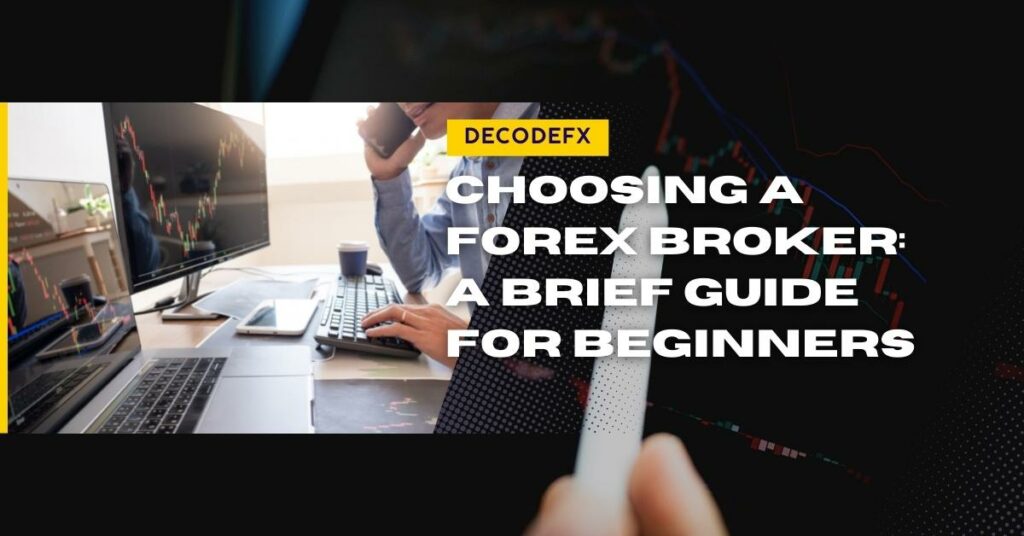If you’re a forex trader or a beginner who is new to trading, then you need to choose a reputable forex broker to ensure that your trading activities run seamlessly. There are many forex brokers available today, and when you visit forex-related websites, you will most likely be bombarded by their adverts. Choosing a brokerage platform is a decision that ought not to be made in haste because your broker largely influences your trading results. From the spreads and commission to leverage, your ability to execute your trading plan correctly would be influenced by your broker. If you are confused about which broker to choose, then here are seven factors to consider when choosing a forex broker.
Factors to Consider When Choosing a Forex Broker
Trading Fees
Trading fees refer to commissions and spreads. They’re fees charged by your broker to execute your trades.
The spread is the difference between the ask price and the bid price of a currency pair. It is the difference between the buying and selling prices, and it largely influences the efficiency and precision of your trade execution. Spreads affect the ability of your broker to trigger your trade orders (limit orders) and trade management orders (stop loss and take profit). The spread is largely influenced by the liquidity of the brokerage platform and the currency pair itself. Highly liquid assets have lower spreads, while less liquid currency pairs have higher spreads. This is because a large number of participants reduces the difference between the bid and ask prices.
Commissions are fees charged for the execution of a trade. Most brokers charge a fee for every lot or mini lot you trade. Before choosing a brokerage platform, ensure that the platform has favorable (preferably low) spreads and commissions.
Regulatory Compliance
Regulated brokers are brokers that are registered with an appropriate regulatory authority. They have to comply with the rules and regulations set by the regulatory body to operate within that jurisdiction.
The Australian Securities and Investment Commission regulates the activities of Australian brokers, while the Monetary Authority of Singapore regulates brokers operating in Singapore.
Regulated brokers usually offer better trading conditions and comply with the best practices when dealing with their clients. If you have any disputes with a regulated broker, you can rest assured that your interest will be protected. Trading with brokers that aren’t regulated can put your capital at risk. Before choosing a forex broker, ensure that the platform is regulated by the appropriate authorities in your jurisdiction.
Tradable Currencies
There are over 50 currency pairs that can be traded in the forex market. If you’re serious about maximizing your trading opportunities, then you may need to trade more currency pairs, minor pairs, and exotic pairs.
Not all brokers offer the range of exotic and minor pairs in forex. You should choose a broker that provides access to a wide range of currency pairs to help you make the most of your trading strategy.
Customer Support
As a trader, there would be times when you’ll need to contact your broker to fix certain problems or obtain information. The quality of service you get and the speed with which your issues are resolved depends on the quality of customer service provided by your broker.
This is extremely important because forex trading is quite time-sensitive, and the forex market never sleeps. If you don’t want to miss trading opportunities while waiting for an issue to be resolved, make sure you choose a broker with excellent customer support.
Leverage and Margin
Leverage in forex allows you to control more money than your capital alone would have allowed. Having leverage can be likened to ‘borrowing’ funds from your broker to increase the purchasing power of your capital. Having a 500:1 leverage means that every $1 of your capital has a purchasing power of $500. Choosing a broker with sufficient leverage helps you compound your capital easily by controlling more money with little capital.
The margin requirements of your broker are also crucial. The initial margin is the minimum amount of money you should have before being allowed to place a trade order. Make sure your broker has a flexible leverage and margin requirement to match the capital you are willing to deposit.
Trading Platform
Your broker’s trading platform is an invaluable tool that allows you to analyze the forex market before placing trades. The best trading platforms provide access to various trading tools; indicators, charting, and technical analysis tools. These help you apply your trading strategy to the platform and execute trades once your conditions are met. The trading platform should have software that permits seamless trade execution with clear ‘buy’ and ‘sell’ buttons. The right user interface makes the platform easy to use and helps traders maximize their trading strategies.
Before opening a trading account, you can try out a demo account on a specific broker to ensure that the platform is suitable for you.
Ease of Deposits and Withdrawals
Deposit and withdrawals methods vary across brokers. Before choosing a brokerage platform to trade with, make sure the deposit and withdrawal methods are convenient and permitted in your country. It would be disheartening to deposit funds and find yourself unable to withdraw afterward.
Besides the transaction methods, the minimum deposits and withdrawals should be assessed too. Choose a broker whose minimum transaction falls within your budget to facilitate easy deposits and withdrawals.
Tips For Selecting A Forex Broker
Evaluate Your Trading Needs
While choosing a broker, consider your needs as a trader and ensure that the brokerage platform meets them. From the spreads and commissions to the currency pairs they offer, you need to ensure that the platform fully caters to your needs and suits your trading style. If you’re a scalper, you need low spreads and speedy trade execution to take advantage of the forex market liquidity during volatile trading sessions. Hence, it would help if you used a broker with low spreads or zero spread accounts.
If you trade exotic pairs and crosses, make sure these pairs are tradable on the brokerage platform with decent spreads and commissions.
Check Out Reviews
If you’re confused about which broker to choose, you should consider reading reviews and honest feedback from other traders and broker review websites. This gives you an insight into the trading conditions and quality of services offered by the broker.
Read the problems encountered by the broker’s clients and how they were resolved. Use the reviews to evaluate the customer service, trading environment, and integrity of the platform.
Open a Demo Account
Demo accounts are free accounts that can be opened on most regulated brokers. These can be used to simulate a live trading account and test out a broker’s services. They’re usually free accounts that can be opened in minutes. You can use this to test the spread, speed of trade execution, customer support, and trading portfolio of your broker. They can provide a hands-on experience for you while allowing you to test out your trading strategy.
If the trading platform and conditions work well, you can then open a live account. While opening a live account, make sure that you don’t deposit all of your capital at once. Begin by depositing a portion of your capital, then trade that for some time. Afterward, initiate a payment to ensure that the withdrawal methods are compatible with the ones available in your country. If the withdrawal is successful, you should evaluate the speed of the withdrawal as well as the withdrawal charges.
Be Wary Of Bonuses
Bonuses are great, but when offered by a broker, they should cause you to evaluate such a broker critically. With forex brokers, there are usually no freebies, and these bonuses have to be regained somehow. Most brokers with high bonuses find ways to mitigate these expenses by altering other trading conditions to your detriment. These can be in the form of high spreads, high commissions, minimum account balance, or high minimum deposit and withdrawal amounts.
Compatibility with Trading Tools
If you trade with trading tools like expert advisors, then make sure that your brokerage platform is compatible with them. This helps you make the most of your trading strategy.
How Many Brokers Should I Have
You should have just enough brokers to meet your trading needs. Brokers have different trading conditions and, as such, may be suitable for different trading styles. It’s totally fine to have a trading platform for scalp trades and another for an entirely different trading style. Your trading strategies may also influence the number of brokers you have. If you’re a scalper, a low spread and high leverage trading environment would be great for you. Swing traders may require less leverage since they execute fewer trades on average compared to scalpers.
How to check if a broker is legit?
If you’re not sure about the legitimacy of your brokerage platform, here are three ways to find out;
Compliance With Regulations
The first step to verifying the legitimacy of a broker is to find out whether or not it’s regulated by the appropriate local and national regulatory authorities. The most trusted brokers are regulated by at least one regulatory body that ensures the broker’s services are legitimate and protect clients’ interests while using the platform. You can check out the websites and publications of regulatory bodies to get a list of brokers registered under them.
Carry Out Research
You can verify the information on your broker’s platform to ensure that they’re legitimate. Duplicitous brokers usually have false information about their operations to encourage people to sign up. If you discover that a brokerage firm operates from a non-existent address, that’s a red flag.
Feedback from Trusted Sources
You can get some feedback from trusted broker review websites that provide information about the nature of a broker’s services.
Start Trading today with Decode Global!
As a trader who is serious about learning forex, you need to register with a regulated and legitimate brokerage firm and execute trades today. This helps you evaluate your performance and keeps you on top of your trading game. So sign up with Decode for your free demo or live account and start trading today!

